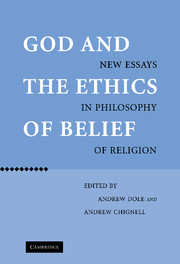Book contents
- Frontmatter
- Contents
- List of Contributors
- Acknowledgments
- The Ethics of Religious Belief: A Recent History
- PART ONE METAPHYSICS: GOD AND CREATURES
- PART TWO EPISTEMOLOGY: GOD AND THE ETHICS OF BELIEF
- PART THREE SOCIAL-POLITICAL PHILOSOPHY: GOD, ETHICS, AND BELIEF
- 8 The Epistemic Authority of Testimony and the Ethics of Belief
- 9 Kant on the Rational Instability of Atheism
- 10 Does Forgiveness Undermine Justice?
- 11 Can Good Christians Be Good Liberals?
- Index
8 - The Epistemic Authority of Testimony and the Ethics of Belief
Published online by Cambridge University Press: 25 July 2009
- Frontmatter
- Contents
- List of Contributors
- Acknowledgments
- The Ethics of Religious Belief: A Recent History
- PART ONE METAPHYSICS: GOD AND CREATURES
- PART TWO EPISTEMOLOGY: GOD AND THE ETHICS OF BELIEF
- PART THREE SOCIAL-POLITICAL PHILOSOPHY: GOD, ETHICS, AND BELIEF
- 8 The Epistemic Authority of Testimony and the Ethics of Belief
- 9 Kant on the Rational Instability of Atheism
- 10 Does Forgiveness Undermine Justice?
- 11 Can Good Christians Be Good Liberals?
- Index
Summary
The social aspects of knowledge and justification are an important dimension of epistemology, and in the history of the field they have often been neglected. Recent work in social epistemology has partially filled this gap, and the literature of epistemology now contains much discussion of testimony and other aspects of the communication of knowledge and, if to a lesser extent, justification. In the history of philosophy, Thomas Reid stands out among major philosophers both for his extensive treatment of testimony and for his distinctive conception of it. My aim is to extend my own account of testimony partly in the light of what we can learn from Reid and partly on the basis of comparing testimony with other major sources of knowledge. I begin with a short statement of some essential points in my account. I then proceed to describe some major elements in Reid's view of testimony and to compare the two positions. In that light, I make a number of points about how testimony works in yielding knowledge and justification, about its status as a source of each, and about some ethical dimensions of our reliance on it. The final section addresses an aspect of the importance of testimony for the philosophy of religion.
TESTIMONY-BASED BELIEF
When philosophers speak of testimony, they usually have in mind not the formal reporting of the court witness, nor even the self-conscious delivery of information in ordinary circumstances, but virtually any instance of someone's telling somebody something.
- Type
- Chapter
- Information
- God and the Ethics of BeliefNew Essays in Philosophy of Religion, pp. 175 - 201Publisher: Cambridge University PressPrint publication year: 2005



